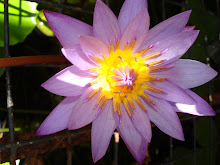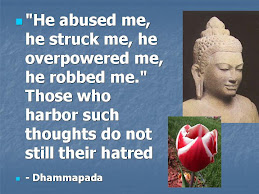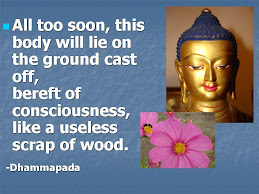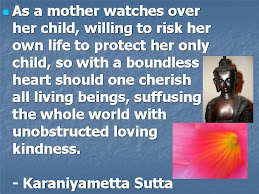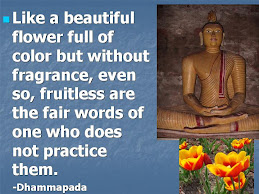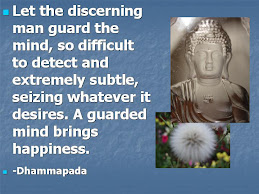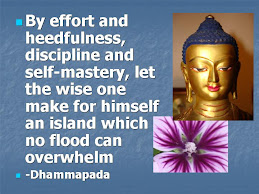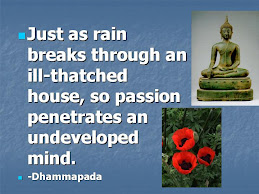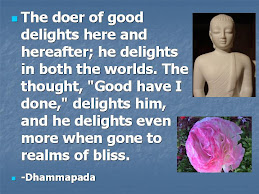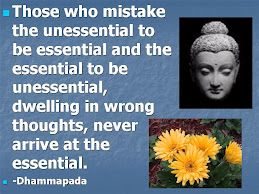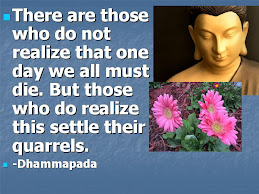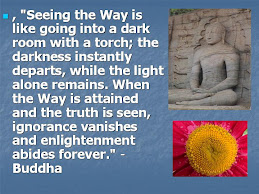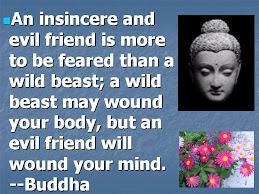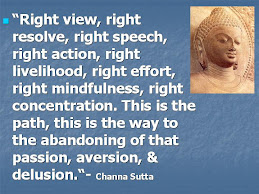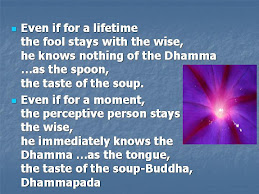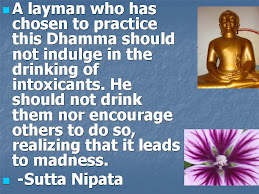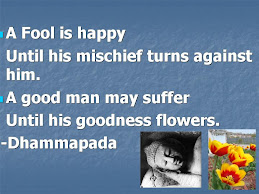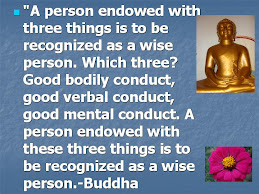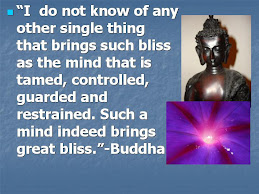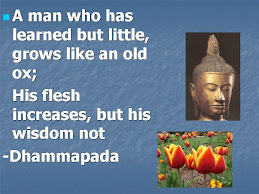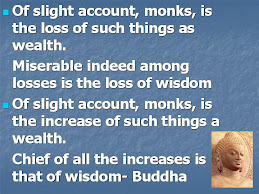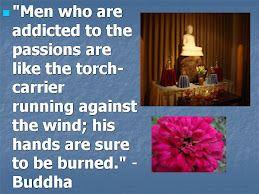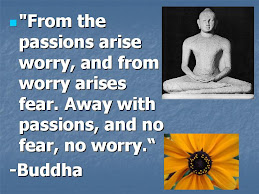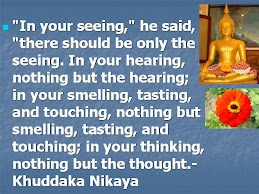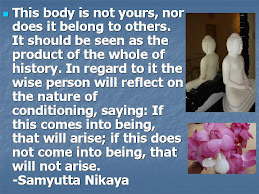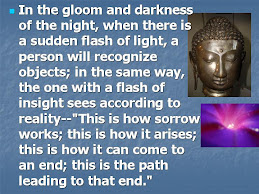
If this sticky, uncouth craving
overcomes you in the world,
your sorrows grow like wild grass
after rain.
-Dhammapada
To Guide people to gain wisdom through practice of mindfulness, based on Buddhist principles.


"Monks, it's just as if there were a boil that had been building for many years with nine openings, nine un-lanced heads. Whatever would ooze out from it would be an uncleanliness oozing out, a stench oozing out, a disgust oozing out. Whatever would be discharged from it would be an uncleanliness discharging, a stench discharging, a disgust discharging.
"'A boil,' monks, is another word for this body composed of the four properties*, born of mother & father, fed on rice & porridge, subject to inconstancy, rubbing & massaging, breaking-up & disintegrating. It has nine openings, nine un-lanced heads. Whatever would ooze out from it would be an uncleanliness oozing out, a stench oozing out, a disgust oozing out. Whatever would be discharged from it would be an uncleanliness discharging, a stench discharging, a disgust discharging. For that reason, you should become disenchanted with this body."

Who in the world
is a man constrained by conscience,
who awakens to censure
like a fine stallion to the whip?
Those restrained by conscience
are rare —
those who go through life
always mindful.
Having reached the end
of suffering & stress,
they go through what is uneven
evenly;
go through what is out-of-tune
in tune.
Note:
The Pali word "Hiri" is translated as conscience here. This is also translated
as shame and is compared to a moat in Nagara sutta (the fortress)... see below:
"Just as the royal frontier fortress has
a moat, both deep & wide, for the protection of those within and to
ward off those without; in the same way, the disciple of the noble ones
has a sense of shame. He feels shame at [the thought of engaging in]
bodily misconduct, verbal misconduct, mental misconduct. He feels shame
at falling into evil, unskillful actions. With shame as his moat, the
disciple of the noble ones abandons what is unskillful, develops what
is skillful, abandons what is blameworthy, develops what is blameless,
and looks after himself with purity. With this second true quality is
he endowed.
Nagara Sutta
Abandoning shamelessness is also a initial step in the path that leads to abandon birth, old age, death (enlightenment) according to Thyodhamma sutta: please see the post below for more details:

On one occasion the Blessed One was staying near Varanasi in the Deer Park at Isipatana. There he addressed the monks: "Monks!"
"Yes, lord," the monks responded.
The Blessed One said: "Once, monks, there was a king named Pacetana. One day King Pacetana said to his chariot maker, 'My good chariot maker, in six months time from now a battle will take place. Can you make me a new pair of chariot wheels?'
"'Yes, your majesty, I can,' the chariot maker replied to the king.
"Then in six months minus six days the chariot maker finished one wheel. King Pacetana said to him, 'In six days time from now the battle will take place. Will the pair of chariot wheels be finished?'
"'Your majesty, in these six months minus six days, I have finished one wheel.'
"'But can you finish the second wheel in these six days?'
"'Yes, your majesty, I can,' the chariot maker replied to the king.
"Then, after finishing the second wheel in six days, the chariot maker took the pair of wheels to the king and, on arrival, said to him, 'Here is your new pair of chariot wheels all finished, your majesty.'
"'And what is the difference between your wheel that took six months minus six days to finish, and your wheel that took six days to finish? I don't see any difference between them at all.'
"'There is a difference between them, your majesty. Look at the difference.' Then the chariot maker took the chariot wheel finished in six days and set it rolling. Going as far as its momentum carried it, it twirled around and around and fell to the ground. But then he took the chariot wheel finished in six months minus six days to finish and set it rolling. Going as far as its momentum carried it, it stood still as if fixed on an axle.
"'Now what is the reason, my good chariot maker, what is the cause, why the chariot wheel finished in six days, when set rolling, goes as far as its momentum carries it and then, twirling around and around, falls to the ground? And what is the reason, what is the cause, why the chariot wheel finished in six months minus six days, when set rolling, goes as far as its momentum carries it and then stands still as if fixed on an axle?'
"'Your majesty, as for the wheel finished in six days, its rim is crooked, with faults & flaws. Its spokes are crooked, with faults & flaws. Its hub is crooked, with faults & flaws. Because its rim... spokes... [&] hub are crooked, with faults & flaws, when set rolling it goes as far as its momentum carries it and then, twirling around and around, falls to the ground. But as for the wheel finished in six months minus six days, its rim is not crooked, with no faults or flaws. Its spokes are not crooked, with no faults or flaws. Its hub is not crooked, with no faults or flaws. Because its rim... spokes... [&] hub are not crooked, with no faults or flaws, when set rolling it goes as far as its momentum carries it and then stands still as if fixed on an axle.'
"Now, monks, the thought may occur to you that the chariot maker on that occasion was someone else, but it shouldn't be seen in that way. I myself was the chariot maker on that occasion. I was skilled in dealing with the crookedness, the faults, the flaws of wood. Now I am a worthy one, rightly self-awakened, skilled in dealing with the crookedness, faults, & flaws of bodily action; skilled in dealing with the crookedness, faults, & flaws of verbal action; skilled in dealing with the crookedness, faults, & flaws of mental action.
"Any monk or nun in whom the crookedness, faults, & flaws of bodily action are not abandoned; the crookedness, faults, & flaws of verbal action are not abandoned; the crookedness, faults, & flaws of mental action are not abandoned has fallen away from this Dhamma & Discipline, just like the wheel finished in six days. But any monk or nun in whom the crookedness, faults, & flaws of bodily action are abandoned; the crookedness, faults, & flaws of verbal action are abandoned; the crookedness, faults, & flaws of mental action are abandoned stands firm in this Dhamma & Discipline, just like the wheel finished in six months minus six days.
"Thus you should train yourselves: 'We will abandon crookedness, faults, & flaws in bodily action. We will abandon crookedness, faults, & flaws in verbal action. We will abandon crookedness, faults, & flaws in mental action.' That's how you should train yourselves."





